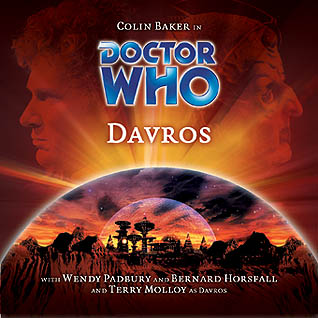
Released September 2003
Lifting a self-imposed ban on the character, Big Finish finally relents for the fortieth anniversary year and brings Davros back to life with Terry Molloy reprising his famous role. Fortunately, Molloy effortlessly recaptures everything that makes Davros so unique and powerful, portraying a convincing combination of ambition, ruthlessness, and madness.
In one of the more sinister opening sequences Big Finish has recorded, events begin with Davros considering his fate after suffering the accident that leaves him crippled. The scientists and medics working on him do not have the courage to kill him since they owe him so much, and the contempt towards them he forms soon gives away to the impassioned decree that he will form a better and more powerful race that he alone will command. The horrific scenes where he smells his own burning flesh and finally sees his reflection make him a temporarily sympathetic figure, though that is dashed incredibly quickly as further insight into the character is gained.
It’s clear as the story progresses that Davros does not have one ounce of decency in him, every word and action caked in pure evil and spite. The script appears to steer dangerously close to having the reason behind Davros’s evil be a lost or spurned love as the fellow scientist Shan is brought into the flashbacks set before his accident. Wisely, though, writer Lance Parkin avoids this pitfall by having Davros use her for his own means, taking credit for her work since he couldn’t stand the competition and ultimately resulting in her execution. Interestingly, though, it was Shan who put the idea of the Dalek programme into Davros’s mind as a means of saving the Kaled race; whereas before he had been open to considering negotiations with the Thals, his entire mindset quickly changed once the word Dalek was mentioned.
For the story proper, business tycoon Arnold Baynes resuscitates Davros in order to gain further profits through use of Davros’s genius. This inevitably turns out to be a poor decision, but it is interesting to see Davros slowly come to grips with concepts of commerce and economies while seeming genuinely interested in making the galaxy a better place. Even without Dalek support, Davros proves what a threat he can be by himself as he eventually gives into his darker nature and just about succeeds in collapsing the entire galactic economy and sending everyone into a state of savagery and war.
Quite successfully, Parkin thus manages to fill in several of the gaps between Davros’s televised appearances. He reveals that he used to survive solely on food pills and rodents, the food pills created from Kaled corpses, and his fascination with famine and these revelations certainly tie into the events of ‘Revelation of the Daleks.’ By using the historian and devout fan of Davros’s Lorraine Baynes- played wonderfully by former companion Wendy Padbury- as a channel for these types of questions, Parkin offers a simple but credible reason for all of the exposition and details; while it’s touching to hear Davros’s reaction to someone who admires him, it’s all the more chilling- especially to Baynes- when he finally reveals that he would not go back to save Shan even if he could.
Of course, this is not a story solely about Davros as Colin Baker’s Sixth Doctor has a formidable presence here as well. Fascinatingly, Davros admits that the Doctor has been the most important person in his life since the creation of the Daleks, the two having been through so much together. It’s probably true, as Davros mentions, that the Doctor and he could have been friends in another time given their love of science; still, it’s fitting that, despite Davros’s respect for the Doctor, Davros doesn’t hesitate to try to kill him at one point and that he also refuses to exchange a hostage for the Doctor because the Doctor wants him to at another. The two understand each other in equal fashion perfectly, and their feuding hate-filled relationship is captured perfectly throughout even as Davros awakens and tells the Doctor to kill him, knowing full well that the Doctor could never do it.
The supporting cast members all give solid performance, though Wendy Padbury and Bernard Horsfall’s Bayneses are the definite highlights. Through Arnold Baynes, the story manages to offer some thoughts about corporations and capitalism, and though he is an incredibly misguided figure even with his code of ethics, he proves to be an integral counterpoint to both the Doctor and Davros and is the instigating factor for the progression of events.
There are not many authors who could simultaneously delve into the character-building moments of Davros in the the far past, fill in crucial gaps in the Davros story between episodes, and bring the respectful animosity of Davros and the Doctor to life so spectacularly, but Lance Parkin manages to do so and creates one of Big Finish’s strongest releases in the process. There is a wealth of untapped potential for Davros, both with and without the Daleks, and hopefully he will show up in more future releases for further exploration.
- Release Date: 9/2003


Leave a Reply